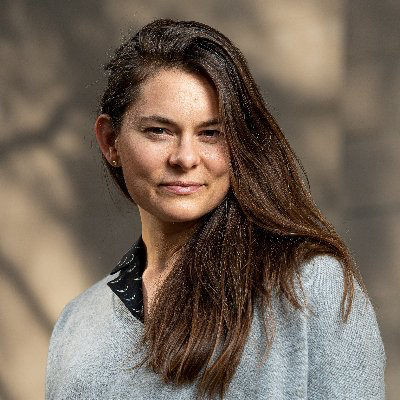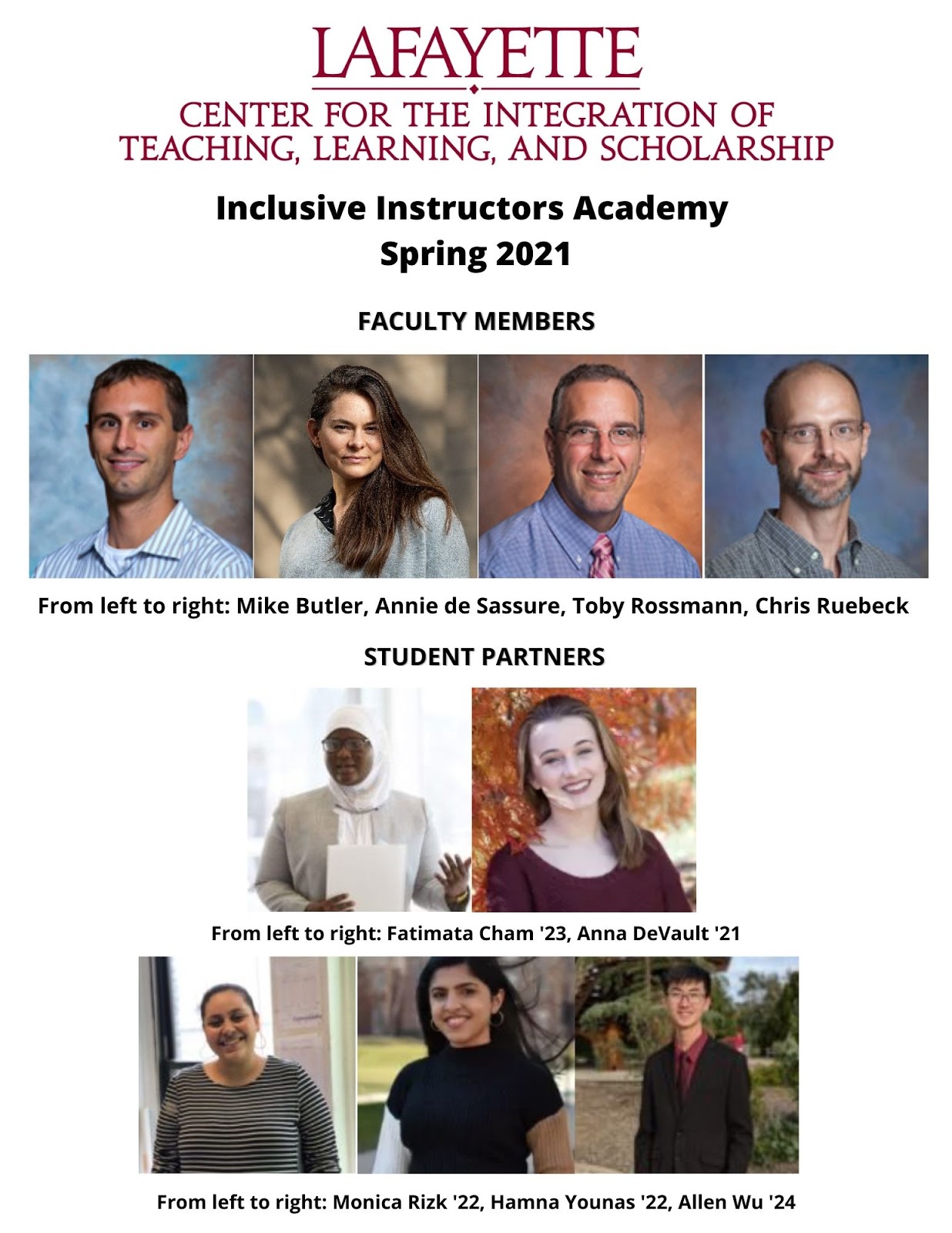Featuring the Spring 2021 Inclusive Instructors Academy Cohort
 Overall, participating in the Inclusive Instructors Academy has helped me to develop a more mindful teaching practice. It has helped me become aware of my strengths as an educator, but also of areas where I can improve. It has challenged me to include more diverse perspectives in my Elementary French class and to make my classes more student-centered. Working with my student partner, Fatimata, has helped open a strong channel of communication between myself and the students… – Professor Annie de Saussure, Foreign Languages and Literatures
Overall, participating in the Inclusive Instructors Academy has helped me to develop a more mindful teaching practice. It has helped me become aware of my strengths as an educator, but also of areas where I can improve. It has challenged me to include more diverse perspectives in my Elementary French class and to make my classes more student-centered. Working with my student partner, Fatimata, has helped open a strong channel of communication between myself and the students… – Professor Annie de Saussure, Foreign Languages and Literatures
 The Inclusive Instructors Academy (IIA) has led me to think critically about creating a classroom and intellectual environment that supports students’ technical and social learning. I want to enable students to further build confidence with skills developed in earlier courses as they utilize them to gain greater understanding in later, more-challenging courses. Working with the student partner and re-thinking my overall approach to complex topics has allowed me to better plan class time, encourage greater participation, and create a more welcoming and inclusive course… – Professor Toby Rossmann, Mechanical Engineering
The Inclusive Instructors Academy (IIA) has led me to think critically about creating a classroom and intellectual environment that supports students’ technical and social learning. I want to enable students to further build confidence with skills developed in earlier courses as they utilize them to gain greater understanding in later, more-challenging courses. Working with the student partner and re-thinking my overall approach to complex topics has allowed me to better plan class time, encourage greater participation, and create a more welcoming and inclusive course… – Professor Toby Rossmann, Mechanical Engineering
The Inclusive Instructors Academy immerses faculty members in a semester-long experience focused on inclusive teaching to advance instructional excellence at the College. Through a comprehensive experience, faculty members develop individual goals for inclusion for the semester, attend monthly meetings, read materials on inclusive teaching, discuss research-supported strategies, implement inclusive teaching approaches, discuss and obtain feedback on their efforts with colleagues and a student pedagogical partner. All participants now also receive a complimentary copy of the recently released book, What Inclusive Instructors Do: Principles and Practices for Excellence in College Teaching, to support their work.
Spring 2021 marks the second semester of the Academy, which was originally launched during the COVID-19 pandemic when many classes were remote. The spring cohort includes four Lafayette faculty members: Mike Butler, associate professor of biology, Annie de Saussure, assistant professor of foreign languages and literatures; Toby Rossmann, associate professor of mechanical engineering; and Chris Ruebeck, associate professor of economics. They are each paired with one of four student partners: Fatimata Cham ‘23, Anna DeVault ‘21, Allen Wu ‘24, and Hamna Younas ‘22. Monica Rizk ‘22 is also serving as the inaugural pedagogical partner available to support faculty members outside of the Academy. All Lafayette faculty members are welcome to submit a request to use the partnership service during the semester.

Spring 2021 Inclusive Instructors Academy Cohort, Faculty and Student Partners
Participating faculty members’ semester-long inclusive teaching goals include integrating social justice content throughout a course, facilitating equitable student participation in class discussions, incorporating diversity-related activities and discussions, as well as helping students develop the skills necessary for future coursework and building self-efficacy. Faculty partners describe the benefits thus far from participating in the program:
The Inclusive Instructors Academy (IIA) has led me to think critically about creating a classroom and intellectual environment that supports students’ technical and social learning. I want to enable students to further build confidence with skills developed in earlier courses as they utilize them to gain greater understanding in later, more-challenging courses. Working with the student partner and re-thinking my overall approach to complex topics has allowed me to better plan class time, encourage greater participation, and create a more welcoming and inclusive course. Being involved with the IIA has assisted me with classroom climate surveys, student focus groups concentrating on equity in my teaching approach, and developing higher levels of participatory learning.” -Toby Rossmann, Mechanical Engineering
One of the most immediate impacts IIA had on my teaching was my approach to assignments. I learned about the TILT framework, and with the help of my student partner, began developing assignments with this framework in mind. The students in my classroom certainly appreciated this different approach. In a mid-semester anonymous survey, my students commented on the resources provided in the latter assignments, and suggested that I employ this approach for all assignments. I never mentioned that I was taking a new approach to designing assignments to them, but they noticed the difference! -Mike Butler, Biology
Overall, participating in the Inclusive Instructors Academy has helped me to develop a more mindful teaching practice. It has helped me become aware of my strengths as an educator, but also of areas where I can improve. It has challenged me to include more diverse perspectives in my Elementary French class and to make my classes more student-centered. Working with my student partner, Fatimata, has helped open a strong channel of communication between myself and the students. It seems that students feel more comfortable and welcome to share their thoughts, questions, and concerns with me thanks to her interventions, and this enhances the learning experience of the class as a whole. It has also been very inspirational to hear how other faculty work to make their classrooms more inclusive. The IIA cohort is very interdisciplinary, and it has been enlightening to learn from other faculty as we share strategies and experiences together. -Annie de Saussure, Foreign Languages and Literatures
I’ve enjoyed learning with my student partner, from my colleagues, and the CITLS staff. In the bigger picture, I’m concerned about both gender and racial imbalances across our majors. We can ask not only about their causes, but about how to be more inclusive so that all students feel welcome. Talking with my colleagues and our student partners can help me think about how students might view the Economics department and major. I’ve learned from feedback to give students more time to think before calling on them, and—especially in remote and hybrid classes—to spend more time going in a round robin with students during explanations and derivations. In collecting my mid-semester feedback, looking at others’ forms caused me to put open-ended questions first in mine and then the more directed questions as follow-up. Chris Ruebeck, Economics
Student partners also play an essential role in the Academy. This semester they have been performing classroom observations and providing feedback to their faculty partners including general observations, as well as using tools such as the Classroom Observation Protocol for Undergraduate STEM to help quantify the teaching behaviors of their faculty partners and learning behaviors of their students. They also have engaged in small group sessions with classes to provide feedback to faculty members and debrief with their faculty partners on mid semester feedback. Additionally, some student partners have worked with their faculty partners to make their assignments more transparent using a research-supported framework called Transparency in Learning and Teaching (TILT). The Inclusive Instructors Academy can be an impactful way for student partners to make a difference in learning environments at Lafayette. Student partners also describe their benefits in participating in the program:
By participating in the Inclusive Instructors Academy at Lafayette College I have learned to value the importance of ensuring that all students are given the resources and opportunities needed in class to succeed. Oftentimes there needs to be a mutually beneficial relationship between the professor and students, so that students can be comfortable asking for help and professors are willing to listen to student feedback on changes that should be made in class. Inclusive teaching recognizes that students should be granted a learning experience that respects diversity, encourages participation, and is open to a range of different learning activities. My participation in the program has allowed me to develop innovative ways to address equity in the classroom. -Hamna Younas ‘22
My participation in this program has helped me gain a better understanding of classroom dynamics, and how to center work around equity and inclusion. Furthermore, how to provide feedback that manifests into changes in the classroom environment. I also enjoyed the student to teacher collaboration within this process that allowed for me to recognize how important student voices and feedback are to making a community a better place. Every student has different backgrounds and experiences that contribute to how they may participate and engage in a classroom setting but that does not mean we cannot take actionable steps towards making it an environment for each other. -Fatimata Cham ‘23
Student partner Anna DeVault’s ‘21 reflections from last semester still ring true and are reposted below:
I think the biggest thing I got out of this experience was learning that my perspective is truly valuable. In a world that is so reliant on academic credentials, I forget that my perspective, simply as a student, is valuable and I am qualified to share my own experience with others. My role as a student partner cemented my faith in my own knowledge, and it was also extremely validating to see that my advice was making a visible difference in the way professors are teaching their classes. It felt like I was really being the change that I wanted to see at Lafayette. – Anna DeVault ‘21
All tenure-line, visiting, and adjunct faculty of any experience level with regards to inclusive teaching are invited to apply to participate in the Fall 2021 Inclusive Instructors Academy! The deadline to apply is May 21, 2021.